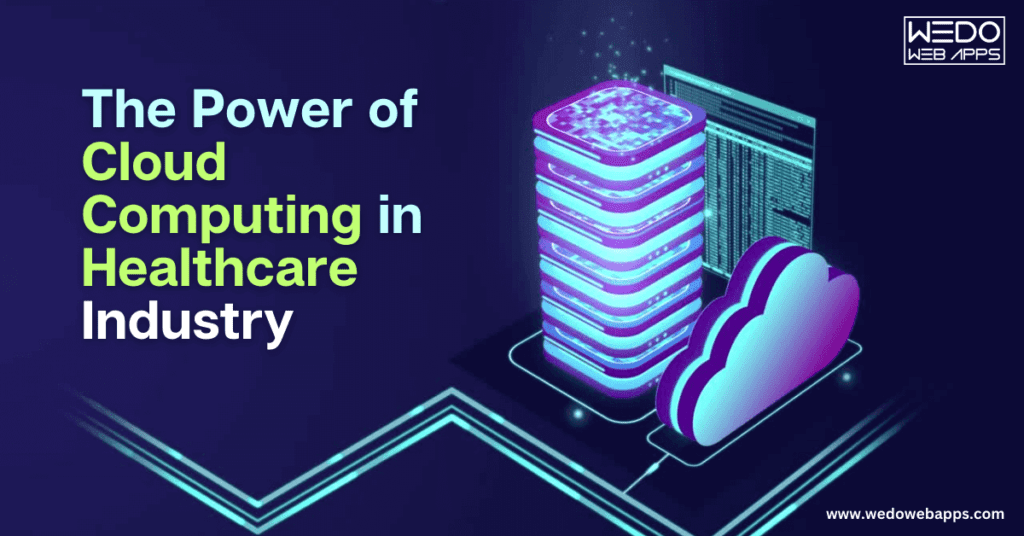14 Jul, 2023 | Cloud Computing Services
The Power of Cloud Computing in Healthcare Industry

What is cloud computing in healthcare?
Cloud solutions in healthcare refer to the utilization of remote servers, accessed through the internet, to store, manage, and process healthcare data and applications. It involves the delivery of computing resources, including servers, storage, databases, software, and analytics, over the Internet on a pay-as-you-go basis. In the context of healthcare, cloud computing for healthcare enables organizations to store and access electronic health records (EHRs), medical images, patient data, and other healthcare-related information in a secure and centralized manner.Benefits of cloud technology in healthcare providers, researchers, and Patients
- Data Storage and Accessibility: Healthcare Cloud computing provides a scalable and reliable platform for storing large volumes of healthcare data. It allows healthcare organizations to securely store and retrieve patient records, test results, images, and other important data from anywhere with an internet connection. This enhances accessibility and facilitates seamless data sharing and collaboration among healthcare professionals.
- Scalability and Flexibility: cloud computing in health care offers the ability to scale computing resources up or down based on demand. Healthcare organizations can dynamically allocate resources to handle peak workloads, such as during periods of high patient volume or when running computationally intensive tasks. This scalability ensures that healthcare providers have the necessary computing power and storage capacity without having to invest in and maintain extensive on-premises infrastructure.
- Cost Efficiency: Cloud computing in healthcare eliminates the need for organizations to purchase and maintain their own physical servers and data centers. Instead, they can leverage cloud service providers' infrastructure, paying only for the resources they consume. This reduces capital expenditures and operational costs, allowing healthcare organizations to allocate resources more efficiently and invest in other critical areas of patient care and research.
- Collaboration and Communication: Cloud computing enables real-time collaboration and communication among healthcare professionals. It allows multiple authorized users to access patient data simultaneously, facilitating interdisciplinary care, remote consultations, and telehealth services. Cloud-based platforms also support secure messaging, file sharing, and video conferencing, enhancing communication and coordination among healthcare teams.
- Security and Compliance: Cloud service providers implement robust security measures to protect sensitive healthcare data. This includes data encryption, access controls, regular security audits, and compliance with industry regulations such as the Health Insurance Portability and Accountability Act (HIPAA). Cloud computing providers often have dedicated security teams and infrastructure to ensure data privacy and maintain regulatory compliance.
- Advanced Analytics and Artificial Intelligence: Cloud computing offers the computational power and storage capacity necessary for advanced analytics and artificial intelligence (AI) applications in healthcare. It enables healthcare organizations to leverage machine learning algorithms, predictive analytics, and AI models to derive insights from large datasets, improve diagnosis accuracy, support clinical decision-making, and enable personalized patient care.
Transforming Healthcare Delivery:
a. Enhanced Collaboration: Cloud computing enables seamless collaboration among healthcare professionals. Real-time access to patient records, test results, and treatment plans streamlines communication and facilitates multidisciplinary care. This improved collaboration leads to more informed decision-making, better care coordination, and ultimately, improved patient outcomes. b. Efficiency and Cost Savings: Cloud computing optimizes healthcare operations by reducing administrative burdens and improving resource allocation. Automated processes, such as appointment scheduling, billing, and claims management, enhance operational efficiency. Cloud based healthcare solutions also eliminate the need for extensive on-site infrastructure, reducing costs associated with hardware maintenance and upgrades. c. Telehealth and Remote Access: The medical cloud computing enables remote access to patient data, supporting telehealth services and remote consultations. Healthcare providers can securely access patient information from anywhere, facilitating timely care delivery, remote monitoring, and the expansion of healthcare services to underserved areas. Patients can also access their health records and engage in virtual consultations, enhancing convenience and accessibility to care.Ensuring Security and Privacy in cloud computing in healthcare industry:
Addressing security concerns is crucial in healthcare, given the sensitive nature of patient data. Cloud computing service providers implement robust security measures to protect patient information. This includes data encryption, access controls, and compliance with healthcare regulations like the Health Insurance Portability and Accountability Act (HIPAA). Cloud based solutions also offer data backup, disaster recovery, and data integrity mechanisms to ensure privacy and continuity of healthcare operations.Exploring Cloud Technology in Healthcare:
a. Advanced Analytics and Machine Learning: Cloud computing empowers healthcare providers to leverage advanced analytics and machine learning algorithms. By harnessing the computational power of the cloud, healthcare organizations can analyze large volumes of data to derive actionable insights. These insights facilitate data-driven decision-making, predictive analytics, and personalized patient care. b. Internet of Medical Things (IoMT): The cloud plays a crucial role in integrating the Internet of Medical Things (IoMT) devices into the healthcare ecosystem. IoMT devices such as wearable health trackers, remote patient monitoring systems, and connected medical devices generate vast amounts of data. Cloud computing allows for seamless aggregation, storage, and analysis of IoMT data, enabling real-time monitoring, early detection of health issues, and proactive interventions. c. Artificial Intelligence in Healthcare: Cloud Computing in hospitals provides the computational power and scalability required for complex artificial intelligence (AI) algorithms. AI has the potential to revolutionize healthcare by enhancing medical imaging analysis, diagnosis support, drug discovery, and patient risk assessment. Cloud based AI models can process and analyze large datasets, enabling faster and more accurate insights to improve patient care.Real-World Implementations in Cloud in Healthcare Industry:
Real-world examples showcase the successful adoption of cloud computing in healthcare. Healthcare organizations have embraced cloud-based electronic health record (EHR) systems, telemedicine platforms, and health information exchanges. These implementations have demonstrated tangible benefits, including improved data accessibility, streamlined workflows, enhanced collaboration, and better patient engagement. Cloud computing has also facilitated interoperability and data sharing among different healthcare providers, leading to more coordinated and comprehensive care delivery.What types of cloud computing are there in Healthcare?
When it comes to cloud computing in healthcare, there are different types of cloud deployments that healthcare organizations can choose from based on their specific needs and requirements. Here are some of the types of cloud computing commonly utilized in the healthcare industry:- Public Cloud: Public cloud computing involves utilizing cloud services provided by third-party vendors, where computing resources are shared among multiple organizations. Healthcare organizations can access and manage their data and applications through the Internet. Public cloud deployments offer scalability, cost-effectiveness, and flexibility, as the infrastructure is managed by the cloud service provider. However, organizations must ensure that proper security measures are in place to protect patient data.
- Private Cloud: Private cloud computing involves dedicated cloud infrastructure that is exclusively used by a single healthcare organization. It can be hosted on-premises or managed by a third-party service provider. Private clouds are particularly suitable for organizations that require stringent data security and compliance with regulatory requirements, such as HIPAA. Private clouds are ideal for organizations with sensitive patient data that need to maintain strict control over their infrastructure.
- Hybrid Cloud: A hybrid cloud allows healthcare organizations to leverage the benefits of both environments. Organizations can host critical and sensitive data on their private cloud infrastructure while utilizing public cloud resources for non-sensitive data or for handling peak workloads. Hybrid clouds offer flexibility, scalability, and cost optimization, enabling healthcare organizations to meet varying demands effectively.
- Community Cloud: Community cloud computing involves multiple organizations within the healthcare industry sharing a cloud infrastructure. It is designed for organizations with common goals, such as regional healthcare networks, research collaborations, or health information exchanges (HIEs). Community clouds offer shared resources, enabling collaboration and data sharing while maintaining the required levels of security and privacy. They allow organizations to work together efficiently and facilitate the exchange of patient information securely.
- Multi-Cloud: Multi-cloud refers to the utilization of multiple cloud service providers to meet specific requirements or avoid vendor lock-in. Healthcare organizations may choose different cloud providers based on their strengths, services, or geographic availability. By adopting a multi-cloud strategy, organizations can leverage the unique capabilities of each provider, optimize costs, and enhance resilience and redundancy. However, managing multiple cloud environments requires careful planning and integration.
Conclusion:
Cloud computing has emerged as a game-changer in the healthcare industry, offering immense potential for improved patient care, enhanced efficiency, and healthcare innovation. By leveraging healthcare cloud services, organizations can store, manage, and access patient data securely, while benefiting from scalability, cost-effectiveness, and collaboration capabilities. Cloud computing in healthcare enables real-time collaboration, remote access to patient information, and the adoption of advanced technologies like AI and IoT. Additionally, it ensures data security, privacy, and compliance with regulatory requirements. As the industry continues to evolve, the power of cloud computing will undoubtedly reshape the future of healthcare, creating a more connected and patient-centric ecosystem. By embracing the potential of cloud computing, healthcare organizations can drive advancements, improve patient outcomes, and deliver high-quality care in an increasingly digital world.Frequently Asked Questions
Cloud computing in healthcare refers to the utilization of cloud-based technologies and services to store, manage, process, and analyze healthcare-related data and applications. It involves leveraging remote servers and networks to access computing resources, enabling healthcare organizations to store data, run applications, and collaborate efficiently.
Benefits include scalability, cost-effectiveness, data accessibility, enhanced security, and disaster recovery capabilities.
Yes, when implemented properly with strong security measures and reputable cloud service providers.
Applications include electronic health records, telemedicine, medical imaging, research and analytics, and health information exchange.
Consider data security, compliance with regulations, reliability, data migration and integration, and vendor reputation and support.
Encryption, access controls, data backups, compliance with regulations, security assessments, and employee training are key measures.
Challenges include data breaches, data loss, vendor lock-in, connectivity and downtime, regulatory compliance, and integration difficulties.
Consider security and compliance, industry experience, scalability, reliability, data migration capabilities, cost-effectiveness, reputation, and customer support.

